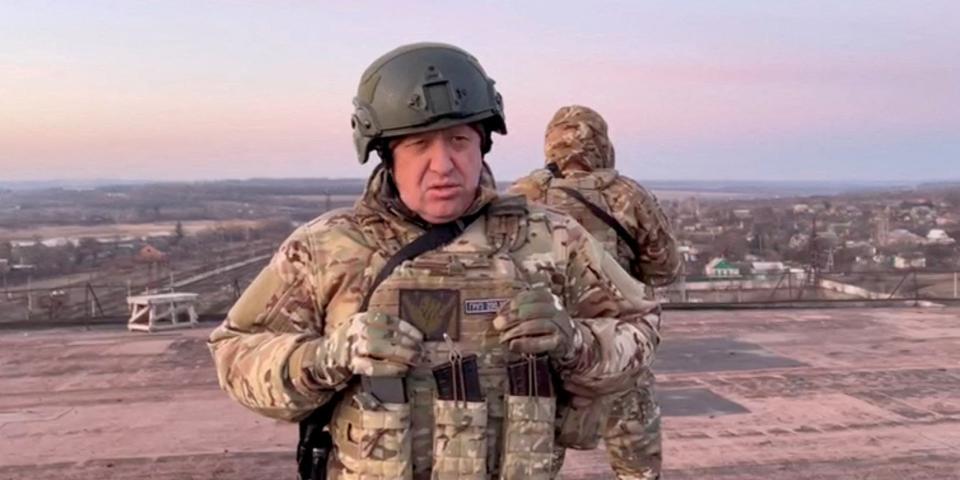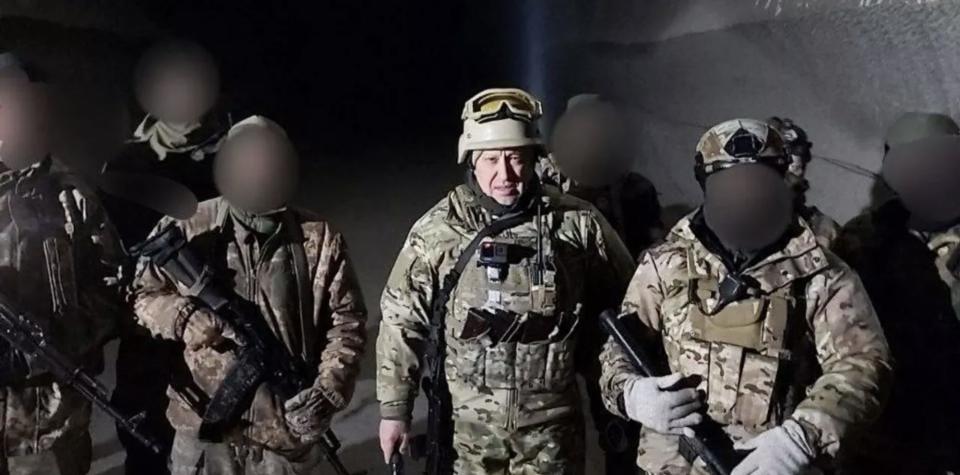Wagner boss Prigozhin is escalating his feud with the Russian military to stay relevant after Bakhmut, but he risks taking it too far, war experts say

Wagner founder and financier Yevgeny Prigozhin continues to escalate his feud with the Russian defense ministry.
War experts assess he aims to "maintain informational relevance" in the wake of Wagner's withdrawal from Bakhmut.
But some prominent voices in Russia's pro-war ultranationalist community are troubled by his antics, ISW observed.
The leader of the paramilitary Wagner Group, Yevgeny Prigozhin, is escalating a bitter feud with the regular Russian military and taking shots at the Russian defense ministry more frequently and with greater intensity to stay relevant, but it may come at a cost.
Wagner recently released a video of the group's mercenaries interrogating a Russian officer, and its founder and financier called the defense ministry's claims of combat victories in Ukraine "science fiction," challenging the Russian narrative. By taking these kinds of actions, as well as other extreme ones, Prigozhin and his mercenaries risk taking things too far and losing some ultranationalist supporters, war experts say.
Wagner's mercenary forces played a prominent role in achieving the costly Russian victory in the eastern Ukrainian city of Bakhmut, where Prigozhin says as many as 20,000 of his fighters died trying to take a city of limited strategic value.
The fierce battle for Bakhmut is the longest and bloodiest of the war so far, and Wagner and Prigozhin were front and center throughout. In the aftermath of the big push to take the city, the battered Wagner forces withdrew, turning over positions to regular Russian forces, which are already facing difficulties holding ground amid Ukrainian counterattacks.
During the battle, Prigozhin, who has become one of the most prominent leaders in Russia's ultranationalist pro-war information space, grew his influence through his regular updates on the conflict, which often provided greater depth than Russian state-run channels. But in that same information space, Prigozhin also voiced repeated, profane, and blunt criticisms of the regular Russian military and its leadership.
This aspect of his online activities appears to have become more pronounced as Wagner forces come off the line and reposition to rear areas.
Prigozhin derives value from his status in ultranationalist spaces, which serve as recruitment channels beneficial to Russian ambitions, but he "can outlive his usefulness for the Kremlin if he does not reconstitute his forces, and his recent rants may be indicative that he senses this vulnerability," Kateryna Stepanenko, an analyst at the Institute for the Study of War, told Insider.
With the Wagner Group's seemingly Pyrrhic victory in Bakhmut of fading interest as the mercenary group pulls back, Prigozhin appears to be overcompensating and escalating to remain relevant.
Prigozhin "needs to make flashy statements about Russian regular forces losing Bakhmut and weaponize situations such as Belgorod Oblast incursions to remain afloat in the information space," Stepanenko said. But there are limits.

Over the weekend, Prigozhin took his spat with the Russian military to a new level, further expanding the divide between Wagner and the Russian defense ministry, by permitting his mercenaries to post video footage of a Wagner interrogation of a captured Russian soldier who appeared to have been beaten.
The captured Russian soldier, who identified himself as Lieutenant Colonel Roman Venevitin of the 72nd Separate Motorized Rifle Brigade, confessed to drunkenly ordering his unit to fire on Wagner forces.
The video elevates Prigozhin and the Wagner Group at the expense of the defense ministry.
ISW wrote in a Tuesday update on the war that "the suggestion that units operating under the Russian MoD are actively firing on Wagner while intoxicated strengthens Prigozhin's argument that the Russian MoD is a combat-ineffective and somewhat nefarious force."

But Prigozhin's constant efforts to disparage the Russian defense ministry, specifically defense minister Sergei Shoigu and Gen. Valery Gerasimov, commander of the Russian war effort, and expose the failures of the regular Russian military appear to be alarming some in the pro-war community who worry the leaders of the Russian forces fighting in Ukraine are losing focus.
"As Prigozhin continues his efforts to maintain informational relevance," ISW argued, "his rhetorical charades will likely further deepen the divide between the MoD and Wagner."
The Washington DC-based think tank which has followed the war closely wrote that this risks "hindering the overall combat-effectiveness of both forces and additionally generating increasing discontent in the information space that used to back him."
Some leading voices in the pro-war milblogging community criticized the feud as "unhealthy" and argued that both sides have seemingly forgotten what they are actually fighting for and just want to be "heroes," ISW noted.
Prigozhin's rhetoric has in many ways become similar to Igor Girkin, a former Russian officer and pro-war critic of Russian military missteps who is "not liked among prominent milbloggers," Stepanenko said.
"Prigozhin is exposing a similar hatred for select individuals within the Russian military command," she said.
She said that Prigozhin still has control over online media companies that promote him and his interests and is likely to maintain his presence in ultranationalist spaces "in the near future," but "more ultranationalist figures might be becoming more aware of his personal vendetta against Shoigu and Gerasimov."
And long term, that may have consequences for the wealthy Russian oligarch now acting as something of a warlord.
Read the original article on Business Insider

 Yahoo Sports
Yahoo Sports 